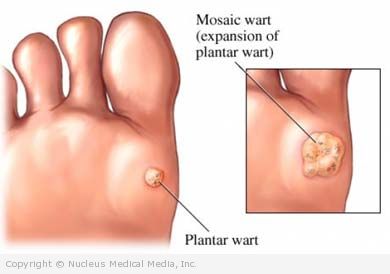Plantar Warts – Definition
Plantar warts are growths on the soles of the feet. They are often mistaken for corns or calluses. The warts are different because a virus causes them.
They grow in clusters and are usually flat. A plantar wart can often be distinguished by numerous black dots visible on their surfaces. Although plantar warts are generally harmless, their location beneath the feet can make them very tender. They also have a tendency to spread locally to other sites on the foot and elsewhere.
Plantar Warts – Causes
Plantar warts are caused by the human papillomavirus (HPV). It can be contracted by walking barefoot on unsanitary surfaces. Touching and scratching can cause the virus to spread.
Plantar Warts – Risk Factors
Factors that increase your chance for plantar warts include:
- Exposing your feet to unsanitary surfaces
- Age: Plantar warts are more common in children and teens.
- Suppressed immune system due to:
- AIDS
- Lymphoma
- Immunosuppressive drugs
- Atopic dermatitis (eczema)
Plantar Warts – Symptoms
Symptoms include:
- Hard, flat growths on the soles of the feet
- Heaped-up calluses surrounding the wart surfaces
- Pain in the area of the warts
Plantar Warts – Diagnosis
The doctor will ask about your symptoms and medical history. Your feet will be examined. Some doctors may wish to refer difficult cases to specialists. Podiatrists focus on foot disorders. Dermatologists focus on skin disorders.
Plantar Warts – Treatment
There are many over-the-counter products available to treat warts. These therapies often contain a mild acid. You can usually apply them when a wart first appears.
Another popular and less expensive treatment is using duct tape to cover a wart for a week at a time. This is also done with weekly “sanding” of the wart with a pumice stone.
You should see a doctor:
- For recurrent warts
- For those that fail to respond to initial treatment
- When over-the-counter therapies are not well-tolerated
- When the diagnosis is unclear
After confirming the diagnosis of plantar warts, the doctor may use one or more of the following:
- Cryotherapy — freezing the warts to kill the virus
- Laser treatment — using a laser to kill the virus and destroy wart tissue
- Electrocautery treatment — burning the wart
- Hyperthermia treatment — applying heat to kill the virus
- Surgical removal — cutting out the warts (with anesthetic)
- Immune therapy—application of substances that stimulate the immune system’s response to the wart-causing virus
Plantar Warts – Prevention
The best ways to prevent plantar warts is to keep your feet from coming into contact with the virus that causes them. Ways to do this include:
- Avoid walking barefoot, except on sandy beaches.
- Wear plastic sandals when showering in public bathrooms.
- Change your shoes and socks daily.
- Keep your feet clean and dry.
- Avoid direct contact with warts, either from other people or from other parts of the body.
In addition, periodically checking for warts on children’s feet may help prevent them from becoming larger and painful.

